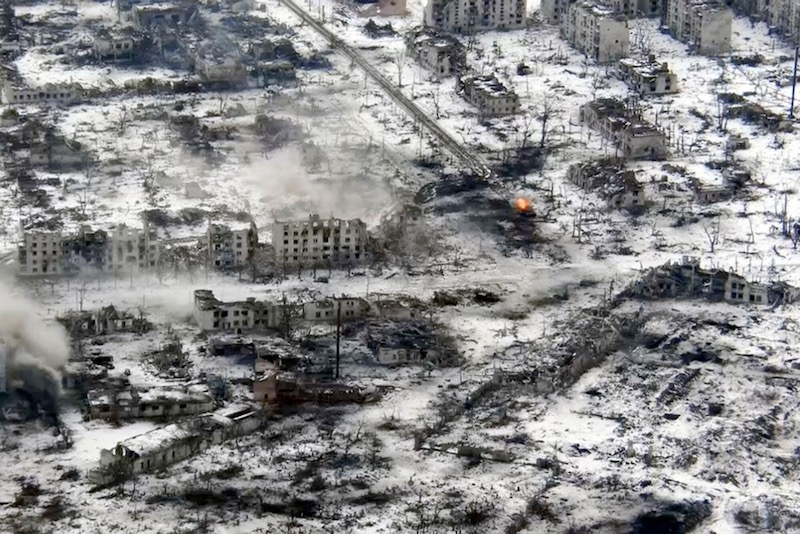Today, 24 February, marks one year of war in Ukraine. It’s the bleakest of anniversaries. One year of war has had a devastating impact on the country, but that’s not to say life doesn’t go on. Ukrainians are showing incredible resilience.
I recently returned from Kharkiv in the far east of Ukraine, near the Russian border. However many videos and photos you see, stories you hear, nothing prepares you for the first time you walk around a neighbourhood that has been completely decimated by war. Building after building blackened by the shelling, half destroyed with so many boarded up windows, Kharkiv has received such heavy shelling that it’s now known as “the city without windows”.
During my trip I had dinner every night with my colleagues Father Vitaliy, Father Jan and Anka Skoryk. They anxiously checked telegram groups for news on local attacks, for news on the day’s devastation.
Anka’s home is one of the many thousands that have been destroyed in Kharkiv. She now lives in the parish, where until this day one year ago, February Depaul had its office. One evening she told me about the long months over the summer when they experienced almost daily shelling, and how the tanks fired 12 rockets every night. Anka described lying in bed and counting the blasts – one, two, three… and only after the final rocket, was she able to sleep. Whilst adjusting to living in a war zone and counting rockets at night time, she was also overseeing Depaul’s humanitarian response, as Depaul Ukraine’s Regional Director for Kharkiv.
Kharkiv hosts Depaul Ukraine’s biggest operation. Day in day out, since the start of the war, the team has continued to work to support those most in need. True to the organisation’s Vincentian values they have developed new projects to respond to emerging needs and the new reality. They now provide food daily to thousands, have opened a new day centre to help internally displaced people and are working hard to repair damage to people’s homes, whilst also keeping our services for homeless people running. Some people who have been living in our homeless shelter since before the war are now part of the humanitarian effort, preparing food packages in the warehouses.
One year of war is a long time for anybody, but a particularly long time for a child. Living with the upheaval and sounds of war and surrounded by destruction, we’re concerned that the impact of the war on children’s mental health will last long after the war is over. In Kharkiv we are now running dedicated programmes to address this.
I visited Depaul Ukraine’s new Children’s Centre where children have a safe space place in which to play and interact, as well as receive targeted psychosocial support. With their schooling interrupted by the Covid pandemic and now the war – some have been learning online for three years. The team tells me how many of these children have lost the confidence to socialise and play.
They explain one of the “go to” icebreakers which I know as “the human knot”. It involves getting groups to stand in a circle and grab the hands of others at random, before then trying to untangle themselves without breaking their hold. After one year of war, the children at the centre struggle to take part. Even with direction the children don’t have the necessary communication skills or confidence to engage with the activity, or with each other. The team say they are making progress but it’s clear how much of an impact the last year has had on the group.
One evening in Kharkiv we visited Depaul Ukraine’s new accommodation projects – using small empty hostels for families who have lost their homes, adapting a model used by Depaul UK to house people during the pandemic. A little boy grinned at my cheekily as I said hello, before slipping shyly back into his family’s room. Depaul Ukraine’s new children’s outreach team visit here throughout the week. The new outreach team provide psychosocial support to children and their parents in Kharkiv and Odesa as well as in one of the city’s bomb shelters, where some children have been living underground for a year.
Depaul Ukraine is part of the wider Depaul International group of global homelessness charities and we are using all we know from our global family to support our incredibly resilient colleagues. All over the world we see that poor mental health is both a cause and consequence of homelessness. So we know that it is therefore imperative children, like those in our children’s centre, and their families have stable accommodation but also urgent psychological support to begin to deal with the trauma at this one year milestone and for the years to come.
Mark Robinson is director of operations, Depaul International.



 Loading ...
Loading ...
What do you think?
You can post as a subscriber user ...
User comments (0)